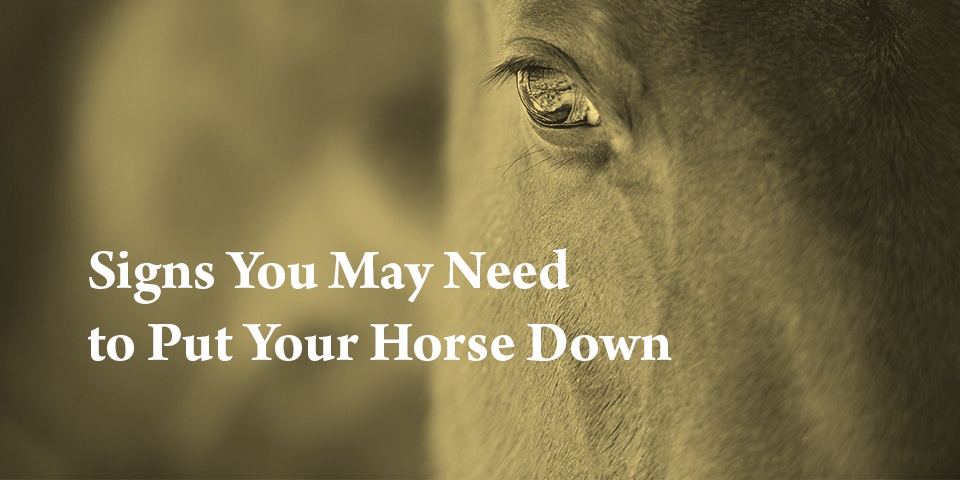
Prolonged unexplained weight loss. Check your horses basic diagnostics.
/Manworkinginthehorsestable-5b89d06d46e0fb00259ae0e0.jpg)
Distention and rupture in your horses stomach or intestines can cause acute death.
Symptoms of horse dying of old age. But a prolonged lack of interest in food especially in an older horse may indicate organ shutdown as the end of life draws nearer. One of the signs a horse is dying can be that it wants to stand up but cannot do so. Signs a Horse May be Dying First and foremost the signs your horse will show that indicate that they are nearing their time to pass on will depend on what the reasoning is for their unwellness.
For example a horse that has been struggling with colic may stop eating. You can often identify an aging horse by the following signs. Diminished eyesight Drooping fetlocks Droopy lips Grey hair Lameness Loss of muscle mass.
The most common cause of death in aged horses was diseases of the digestive system with this diagnosis being made in almost 50 of horses. Complete data was collected on 118 horses that had died or were euthanized of which the majority 94 were euthanized. The most common reasons.
I have had two of the older looking judging by toenail length and the fact that they dont even go in they laying boxes and their vents seem dry hens just die in their sleep. The one last night seemed fine all day at 730pm when I gave them their treat to. My 23yr old horse was found dead in the field by me.
His rug has been ripped off at the breast straps in an adjoining field quite a way from where he was found a leg strap in another adjoining field and a trail of bits of his rug that he had destroyed and he had collapsed hidden away in a woodland area that they never normally go in. A horse that is ready to die will often stop eating or lay down for longer and longer periods. You may also see a change in the herd dynamics as one horse approaches death.
I knew my donkey Lady was ready to go when I saw my mule Tess starting to spend more time away from her. Common symptoms in this period also include physical changes such as. Increased susceptibility to infections.
Prolonged unexplained weight loss. Swelling of the abdomen such as edema or ascites. Feeble he fell asleep the other week when he had company over and he was talking with them then fell asleep out of nowhere.
Hes really slow moving now he was pushing a wheelbarrow when I was over there and was out of breath just after a few feet needless to say I. Arthritis is certainly not confined to older horses but it typically gets worse with age and may even appear in an older horse that did not have problems at a younger age. Part of the problem is that the basic maintenance processes slow down as the horse ages.
Ponies tend to live somewhat longer than horses so they are overrepresented in the aged equine set. Maladies of the digestive musculoskeletal respiratory and endocrine systems are the problems seen most often in older horses and ponies. Digestive system Colic heads the list of digestive problems for the senior horse.
Digestive and absorptive processes are decreased in older horses and this is reflected in a greater percentage of large colon impactions as compared to younger horses. Again however this could also be a sign of an unrelated illness or condition so seek out veterinary care if you are in doubt. It is normal for everyone–human and dog–to start slowing down as we age.
Old horses can get many different types of colic as with any horse and most are not caused by lipoma. However old horses tend to be stoic so they might not display the expected signs of small intestinal strangulation and this lesion could then be missed. This brings us to the most critical step in any horse with severe colic lipoma or other.
Though not diagnostic the atonic anus does suggest a possible neurological disease involving the sacral or lower motor neurons for a list of possibilities see Equine Diseases Nervous System Incoordination Weakness Spasticity Tremors Diagnosing Incoordination Ataxia and. Many dying cancer patients and many more people dying from the end-result of multiple pathology in old age have symptoms other than painsuch as delirium urinary and faecal incontinence sores and discharges. These can be successfully managed in fit elderly people but become less controllable as the body disintegrates.
Check your horses basic diagnostics. This means your horses pulseheart rate respiratory rate and temperature. Pulse - The normal heart rate for a horse is 25-42 beats per minute.
To check the horses heart rate place your palm on the horses. In reality simply being old does not result in loss of life. The number of old horses is increasing due to improved veterinary care and the willingness of owners to manage horses into their 20s 30s and even 40s noted Kathleen Crandell PhD a Kentucky Equine Research nutritionist.
Rather than simply watching horses age. Experiencing a more subdued or depressed mood. As dying gets even closer those who will pass away due to old age may experience a shift in their breathing pattern no appetite and no desire to drink poor blood circulation and increased agitation.
Distention and rupture in your horses stomach or intestines can cause acute death. The first indication of a severe gastrointestinal problem is colic symptoms. Dehydration and impaction severe parasite load a twisting or telescoping of the intestine and other blockages can cause the intestine or stomach to rupture.